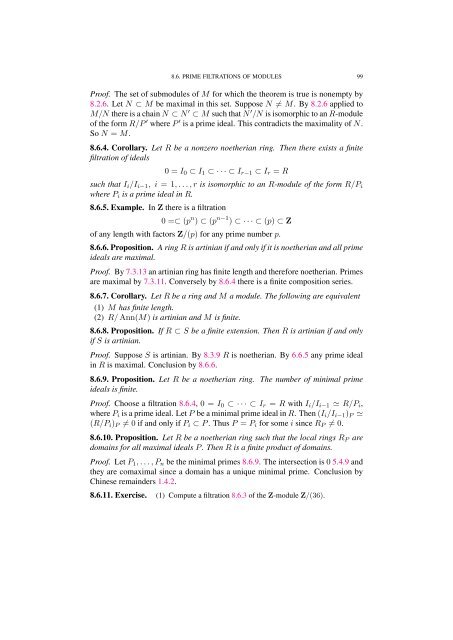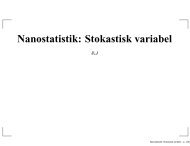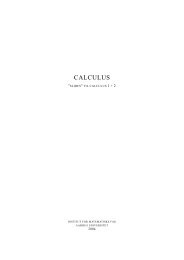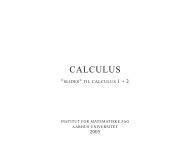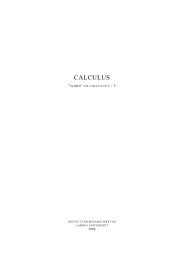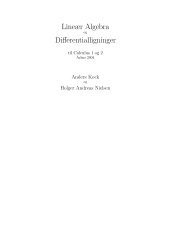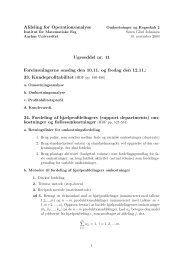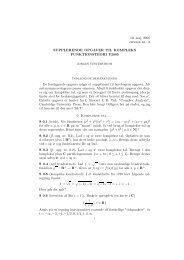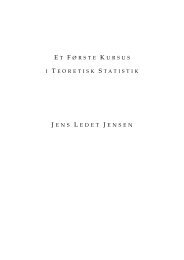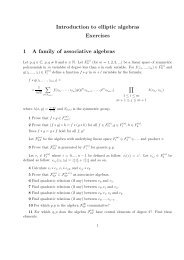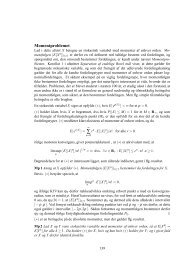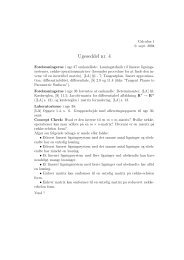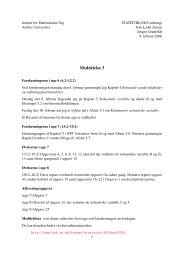Commutative algebra - Department of Mathematical Sciences - old ...
Commutative algebra - Department of Mathematical Sciences - old ...
Commutative algebra - Department of Mathematical Sciences - old ...
You also want an ePaper? Increase the reach of your titles
YUMPU automatically turns print PDFs into web optimized ePapers that Google loves.
8.6. PRIME FILTRATIONS OF MODULES 99<br />
Pro<strong>of</strong>. The set <strong>of</strong> submodules <strong>of</strong> M for which the theorem is true is nonempty by<br />
8.2.6. Let N ⊂ M be maximal in this set. Suppose N = M. By 8.2.6 applied to<br />
M/N there is a chain N ⊂ N ′ ⊂ M such that N ′ /N is isomorphic to an R-module<br />
<strong>of</strong> the form R/P ′ where P ′ is a prime ideal. This contradicts the maximality <strong>of</strong> N.<br />
So N = M.<br />
8.6.4. Corollary. Let R be a nonzero noetherian ring. Then there exists a finite<br />
filtration <strong>of</strong> ideals<br />
0 = I0 ⊂ I1 ⊂ · · · ⊂ Ir−1 ⊂ Ir = R<br />
such that Ii/Ii−1, i = 1, . . . , r is isomorphic to an R-module <strong>of</strong> the form R/Pi<br />
where Pi is a prime ideal in R.<br />
8.6.5. Example. In Z there is a filtration<br />
0 =⊂ (p n ) ⊂ (p n−1 ) ⊂ · · · ⊂ (p) ⊂ Z<br />
<strong>of</strong> any length with factors Z/(p) for any prime number p.<br />
8.6.6. Proposition. A ring R is artinian if and only if it is noetherian and all prime<br />
ideals are maximal.<br />
Pro<strong>of</strong>. By 7.3.13 an artinian ring has finite length and therefore noetherian. Primes<br />
are maximal by 7.3.11. Conversely by 8.6.4 there is a finite composition series.<br />
8.6.7. Corollary. Let R be a ring and M a module. The following are equivalent<br />
(1) M has finite length.<br />
(2) R/ Ann(M) is artinian and M is finite.<br />
8.6.8. Proposition. If R ⊂ S be a finite extension. Then R is artinian if and only<br />
if S is artinian.<br />
Pro<strong>of</strong>. Suppose S is artinian. By 8.3.9 R is noetherian. By 6.6.5 any prime ideal<br />
in R is maximal. Conclusion by 8.6.6.<br />
8.6.9. Proposition. Let R be a noetherian ring. The number <strong>of</strong> minimal prime<br />
ideals is finite.<br />
Pro<strong>of</strong>. Choose a filtration 8.6.4, 0 = I0 ⊂ · · · ⊂ Ir = R with Ii/Ii−1 R/Pi,<br />
where Pi is a prime ideal. Let P be a minimal prime ideal in R. Then (Ii/Ii−1)P <br />
(R/Pi)P = 0 if and only if Pi ⊂ P . Thus P = Pi for some i since RP = 0.<br />
8.6.10. Proposition. Let R be a noetherian ring such that the local rings RP are<br />
domains for all maximal ideals P . Then R is a finite product <strong>of</strong> domains.<br />
Pro<strong>of</strong>. Let P1, . . . , Pn be the minimal primes 8.6.9. The intersection is 0 5.4.9 and<br />
they are comaximal since a domain has a unique minimal prime. Conclusion by<br />
Chinese remainders 1.4.2.<br />
8.6.11. Exercise. (1) Compute a filtration 8.6.3 <strong>of</strong> the Z-module Z/(36).


